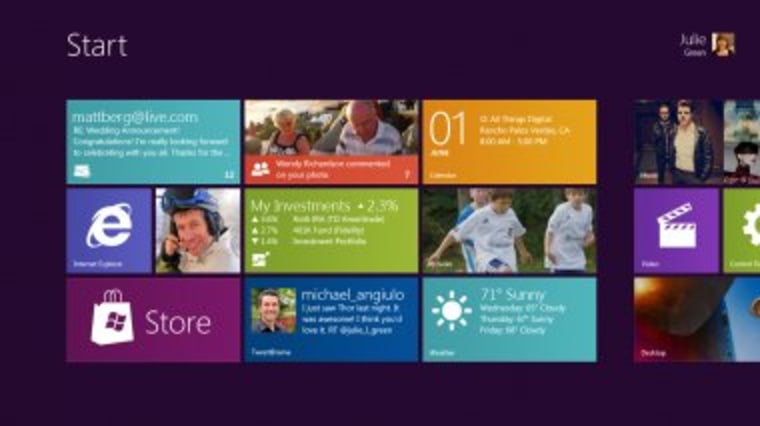As Microsoft has been previewing new elements of the upcoming Windows 8 operating system over the past week — including smarter file copying and a Windows Explorer ribbon — one head-scratcher has been the departure from the look and feel of the new Windows 8 Start screen that Microsoft showed in June.
That new approach, inspired by the tile-based “Metro” design of Windows Phone, was designed to work not only on tablets but also on traditional computers.
(Msnbc.com is a joint venture of Microsoft and NBC Universal.)
So what gives? Steven Sinofsky, the president of the Microsoft Windows division, addressed that question this morning — acknowledging in a blog post that some might want Microsoft to scrap the old Windows approach entirely, but saying that the company believes "there is room for a more elegant, perhaps a more nuanced, approach." He continued ...
[I]f you want to stay permanently immersed in that Metro world, you will never see the desktop—we won’t even load it (literally the code will not be loaded) unless you explicitly choose to go there! This is Windows reimagined. But if you do see value in the desktop experience — in precise control, in powerful windowing and file management, in compatibility with hundreds of thousands of existing programs and devices, in support of your business software, those capabilities are right at your fingertips as well. You don’t need to change to a different device if you want to edit photos or movies professionally, create documents for your job or school, manage a large corpus of media or data, or get done the infinite number of things people do with a PC today. And if you don’t want to do any of those "PC" things, then you don’t have to and you’re not paying for them in memory, battery life, or hardware requirements. If you do want or need this functionality, then you can switch to it with ease and fluidity because Windows is right there. Essentially, you can think of the Windows desktop as just another app.
That last sentence is pretty remarkable, considering the source, and the billions upon billions of dollars that this "app" has generated for the company over the years. It shows how much the PC world is changing. It's hard to imagine anyone from Microsoft saying that even last year.
Microsoft is due to give more details on Windows 8 at a conference in two weeks in California. No official release date has been given, but the new operating system is widely expected sometime next year.
Related posts on GeekWire:
- What Apple can learn from Microsoft in the post-Jobs era
- Microsoft loses ground in mobile as Google Android soars
- Conan O'Brien tests the limits of Bill Gates' charity
Todd Bishop of GeekWire can be followed on Facebook and Twitter.
